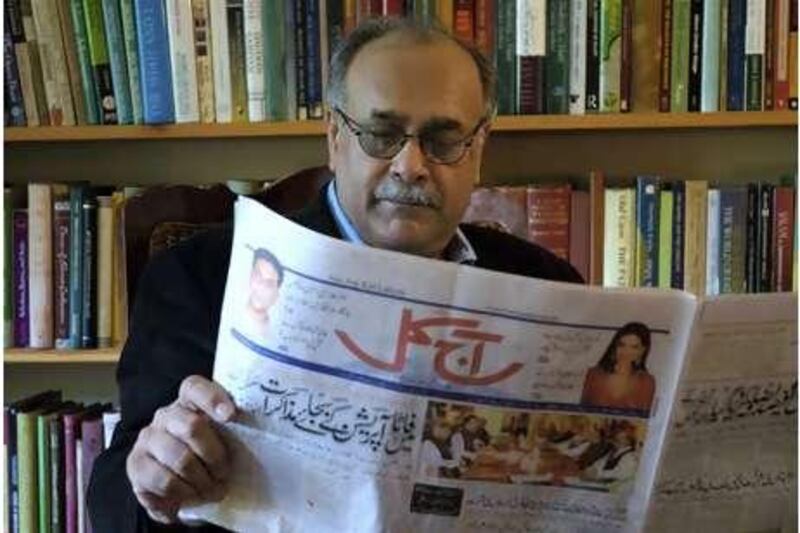ISLAMABAD // In the fight against religious extremism and intolerance in this terrorism-ravaged country, an ambitious, new newspaper jumped into the fray but soon found itself under attack and its journalists facing threats. Aaj Kal, an Urdu language newspaper that was launched early this year, sought to uphold the ideals of moderation, tolerance and freedom of thought, according to its publisher and editor, Najam Sethi.
Published in Lahore, the intellectual and cultural capital of the country, the paper prides itself on its hard-hitting commentary and editorial policy criticising religious extremism and the pervasive effects of "Talibanisation". But now the staff at the paper are under threat from the very same religious extremists they have condemned. Mr Sethi, the editor-in-chief, and one of the most renowned journalists in the country, said he has been forced to send his children overseas, and is taking personal security measures to protect his life.
Last week, Mr Sethi said, a man calmly walked up to his office in Lahore and handed him a letter. It read: "We had hoped you would repent. Instead, you are writing editorials against us. Do you want us to close both papers down? Beware. Our patience is running out." Perhaps attracting the wrath of the radical, religious elements who have been emboldened in recent months and have challenged the state with brazen audacity, should not be a surprise.
"Our editorial policy is very upfront and aggressive," Mr Sethi said. "We were not expecting a confrontation. We were conscious of the fact that whatever we are writing has never been discussed in the Urdu press," he said. Mr Sethi said the liberal, progressive and anti-Taliban and anti-al Qa'eda approach of the newspaper appealed to more moderate constituencies in the North West Frontier Province, where Taliban forces are increasingly gaining ground.
Both the Pakistan People's Party and the Awami National Party, which govern the area as a coalition, have been vocal in speaking out against the growing menace of Talibanisation and religious extremism. They defeated religious parties in the last general elections. Still, religious extremists have tried to block the sales and distribution of the newspaper in several districts Mr Sethi said. A cartoon carried in the paper earlier this month set off a trail of threats.
The cartoon showed Umm-e-Hassan, the leader of female students at Jamia Hafsa, a school affiliated with the Red Mosque compound in Islamabad, teaching her students how to wage jihad and become suicide bombers. The Red Mosque was the scene of a bloody standoff and siege last July. The Pakistan army battled hardline militants holed up inside the mosque and school compound for eight days before taking it over. The exact number of those killed remains disputed.
Clerics at the Red Mosque were incensed and reacted angrily to the cartoon. In angry Friday sermons, they warned Mr Sethi not to "test their patience". He had already been denounced as an "Anti-Islamic American agent". In many ways Aaj Kal is pushing the boundaries of journalism; and pushes the message that moderates need to unite against the forces of religious extremism. Its format, also, is also considered to be daring by many in a conservative society. The front-page has a modern look, and is often splashed with glamorous pictures of models and actresses.
Comparatively, Urdu newspapers have a broad reader base as compared to English papers and are traditionally more nationalistic. Religion is an essential staple of the national and world view of the local Urdu press. Pakistan, considered an ally of the United States in its "war against terrorism", is teetering on the fragile edges of chaos and internal conflict. The western borders are aflame. Pakistan military is engaged, many say half-heartedly, in battling Taliban and pro al Qa'eda elements based in the semiautonomous tribal areas, straddling the border with Afghanistan.
Reprisal attacks, especially suicide attacks, against Pakistani military and security apparatus made 2007 one of the bloodiest years for Pakistan. In the middle of the violence, journalists have often found themselves the target. Threats and intimidation have come not only from the religious extremists but also from the regime of Pervez Musharraf, the president, unhappy with critical coverage of his policies.
According to a report by Internews, a non-governmental organisation, May 3 2007 to May 3 2008 was the most violent year for journalists. Fifteen journalists were killed while doing their job, 357 were arrested, 123 injured in physical assaults, 154 were harassed while there were 18 cases of attacks and ransacking of media properties and 88 cases of various gag orders issued by the government, according to the report.
In November, when Mr Musharraf imposed a state of emergency and ousted the supreme court judges who were ostensibly questioning his candidature as president, private television networks were taken off air. They were allowed back only after they agreed to water down their criticism of Mr Musharraf and his policies. The threats to Aaj Kal and accusations its staff are against the Red Mosque have been widely condemned by the local and international press and rights groups. Last week, journalists protested in Islamabad to express solidarity with the paper, and to condemn the threats.
"The accusations leave [the paper's journalists] vulnerable to attack by militant groups at a time when civil violence is on the rise," Committee to Protect Journalists said in a letter to Yousaf Raza Gilani, the prime minister. "The CPJ takes these threats very seriously. Made in the context of the widespread civil unrest and violence in Pakistan, anyone who is considered an enemy of the mosque's supporters, particularly those who work for a civilian media organisation, is at great risk," it said.
* The National





